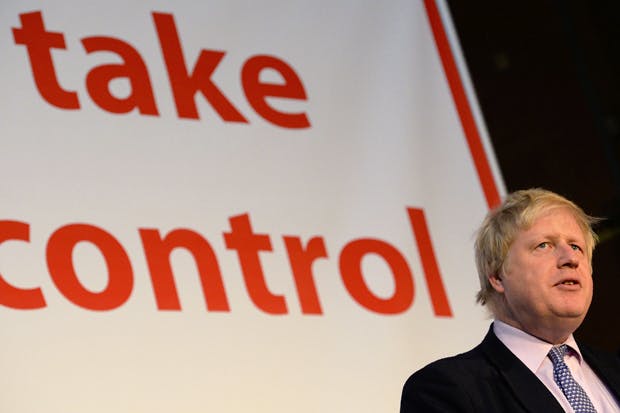It may be too late. But with only about three weeks before our referendum on EU membership I am itching to take the leadership of the Leave campaign. I could do them a power of good.
Two serious objections may be raised to my bid. First, I couldn’t chair a parish meeting, let alone a snakepit of warring Leave enthusiasts. Secondly, I certainly don’t think Britain should leave the European Union.
Setting these disqualifications aside, however, as a former speechwriter and politician I see so clearly the strategic direction the Leave campaign should set if they are to stand an outside chance of winning — and a much greater chance of losing with honour. I find myself barking advice at the radio whenever one of them is on. From a purely professional point of view, it’s just so painful to hear people failing to rise to a challenge. Even in a misconceived grand project, uninspired design and clumsy workmanship offend, and you don’t have to believe in God to feel the thrill of designing a cathedral.
Since the call is unlikely to come, let me share with Spectator readers the pitch I’d make for the job. I would start by reminding them that, at this best, Michael Foot was one of finest orators of his generation. The former Labour leader’s advice has stayed with me, for it is a truth about communication, not just rhetoric.
A good speech, Foot used to say, will mercilessly exploit the weak points in the opposing side’s argument. So far, so obvious. ‘But a great speech will acknowledge and answer the opposing argument’s strengths.’
And this is the key. Both sides in the European debate have been making an essentially defensive case. Both try to pick apart their opponents. The Remain side have no choice, but Leave surely do.
Remain know that we do not love the European Union. The ‘positive case for Europe’ will engage few and enrage many. The weaknesses in Leave’s argument, meanwhile, are obvious. Brexiteers advocate a leap in the dark, and voters will worry about the essentially imponderable economic consequences. So Remainers scorn Leavers for haziness and confusion. Correctly observing that Leave cannot guarantee that nothing bad could happen, Remain hammer away at all the bad things that might. Though unedifying, Remain’s strategy is the best available.
Leave’s is not. Yet they too have been concentrating on picking apart the weaknesses in the Remain case. Dismally, they dwell on everything there is to dislike about the EU. Stung, they protest that Remain are fear-mongering. And they end up looking dismal and stung.
A brave Leave orator such as I would stop trying to dodge Remain’s onslaught and whimpering ‘They’re cheating’. I would take it head on. I would acknowledge — indeed I would volunteer — the immense central strength of the Remain case, which is ‘better the devil you know’.
What a powerful piece of advice (I would say) is that! How eloquently it whispers to our fears. How subtly it inflames our insecurities. How cruelly it plays upon our lack of self-esteem. How many great enterprises have been thought better of, how many brave journeys have never been started, amid a swelling murmur of ‘better the devil you know’.
Someone should have warned Christopher Columbus ‘Better the devil you know’. Instead some reckless fool ventured the thought that in order to discover a new continent you must be prepared to lose sight of the old one. How could Francis Drake feel so hopeful that he could circumnavigate the globe? If Captain Cook had stuck with the devil he knew, he could have enjoyed a prosperous career in the merchant navy.
Someone should have advised that ambitious young politician Abraham Lincoln to stick with the southern devil he knew. Couldn’t Emmeline Pankhurst see that giving women the vote was a leap in the dark? ‘Better the devil you know’ was precisely the argument of the Tory wets against Margaret Thatcher’s plans to turn and face her country’s decline.
Steam trains, flying, space travel, empire… every great leap in human history has been by definition into the unknown. And every one has been launched amid a susurration of whispers about the incontestable security of sticking with the devils we knew. Almost every hero we’ve ever had, almost every big, good thing we’ve ever achieved, has first had to brush away a swarm of reasonable doubts, and embrace the unknowable. So my case for Leave would of necessity have more of Moses than of Doubting Thomas about it. Unless the Leave campaign can capture something of St Crispin’s Day, it can have no hope.
To do this, you don’t pretend. You don’t pretend the doubts are not there. You don’t pretend the doubts are unreasonable. You don’t pretend the venture could not fail. You dare people to believe that success is possible. You make the magnitude of the endeavour and (implicitly) the opacity of the future — the faith and courage that will be needed — your very selling point. Implicitly the question is ‘Are you big enough for this?’; ‘Are we brave enough for this?’; ‘Raise your voice if you’re up for this.’
In a nice symmetry, I cannot guarantee that my campaign strategy would succeed in securing a victory for Leave. To acknowledge to the British people that we’d be taking a hell of a risk would, itself, be a hell of a risk. But there would be something noble about it, something manly — and, articulated with flair and guts, I believe it might catch fire.
Less heroically, I think it offers a sounder insurance policy in the event of failure than does the present apparent policy: a sort of synchronised yelping that Remain cheated, ‘we were lied to’, etc. There’s something craven, something bad-loser-ish about this. How much better to be able to say: ‘They won by making people afraid. We lost because we asked people to be brave, and the people were in the end unwilling.’ You could say that with your head held high.
Got something to add? Join the discussion and comment below.
Get 10 issues for just $10
Subscribe to The Spectator Australia today for the next 10 magazine issues, plus full online access, for just $10.















Comments
Don't miss out
Join the conversation with other Spectator Australia readers. Subscribe to leave a comment.
SUBSCRIBEAlready a subscriber? Log in